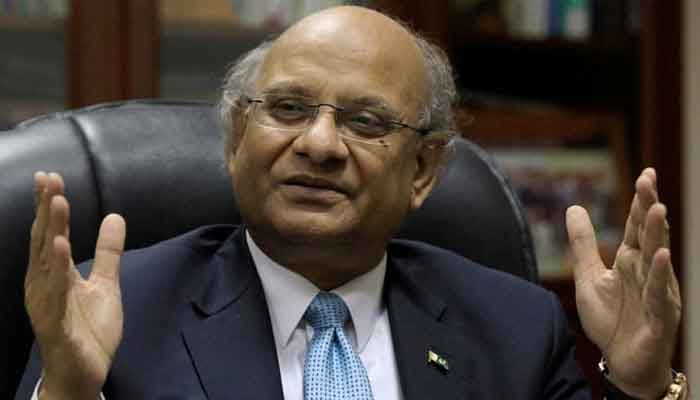Hike in discount rate may further slow down growth, says Dr Ashfaq
ISLAMABAD: Raising the discount rate by the central bank by 150 basis points to 12.25 percent will serve nothing, but further slow down the growth as private sector will not borrow loans at 15-16 percent interest from commercial banks, and the government would become the biggest client of commercial banks as it will get the loans through Pakistan Investment Bonds (PIBs) and treasury bills for budget financing.
“This means commercial banks will be doing business with the government rather than the banking and why should commercial banks lend money to private sector and take risk of non-performing loans (NPLs). They (commercial banks) will be happy to park their money with the government along with sovereign guarantees,” Dr Ashfaq Hasan Khan, eminent economist who is currently rendering meritorious services as Principal and Dean of School of Social Sciences and Humanities at NUST, said while talking to The News.
“Raising of discount rate is a bonanza for commercial banks as they will be the major beneficiary of the hike in discount rate,” he said.
Dr Ashfaq said the government is bound not to borrow from the central bank under the commitment extended to the IMF and will be forced to generate financing through treasury bills and PIBs from commercial banks under higher rates.
Under the prior action to qualify for the IMF loan programme, the central bank has increased the discount rate at 12.25 percent which may further increase in July up to 12.50 percent. At the higher interest rate of 15-16 percent, who will invest by borrowing from commercial banks? Resultantly, the growth will further tumble.
Dr Ashfaq argued saying that increasing the discount rate will also have serious budgetary implications as debt servicing will balloon manifold raising its total expenditures. “Given that the revenue is not going to increase at the pace of rising expenditures, therefore, budget deficit will swell substantially. Raising discount rate is at odd with IMF target to reduce budget deficit and in other words is anti to reduction in deficit,” he said.
Dr Ashfaq said he is unable to understand the logic of raising discount rates to control inflation. “I would urge the State Bank of Pakistan to explain transmission mechanism from raising discount rate to controlling inflation,” he said.
He asked that by looking at the composition of Pakistan Investment Bond (PIB) basket, can higher discount rate reduce fixed inflation, education fee, house rent and transport charges?
This higher discount rate can, he said, control inflation in advanced country like the United States wherein households borrow from commercial banks to purchase consumers durables and even housing.
“I would urge the central bank to get out of textbooks economics and come out with out of box solutions,” he said.
Erum Zaidi adds from Karachi: The rate hike beat the stock market expectations.
“This was higher than the market expectations,” brokerage Topline Research said. “The rate hike would be negative for leveraged sectors, like cement, steel and fertiliser.”
Muhammad Faizan, head of Foreign Institutional Sales at brokerage Next Capital Limited said the last time the policy rate was raised this much was in November 2018.
“Entering the IMF (International Monetary Fund) program would require to develop the long-term yield curve and convert Rs2 trillion of treasury bills into PIBs (Pakistan Investment Bonds) in FY20 alone,” Faizan said.
-
 King Charles ‘very Much’ Wants Andrew To Testify At US Congress
King Charles ‘very Much’ Wants Andrew To Testify At US Congress -
 Rosie O’Donnell Secretly Returned To US To Test Safety
Rosie O’Donnell Secretly Returned To US To Test Safety -
 Meghan Markle, Prince Harry Spotted On Date Night On Valentine’s Day
Meghan Markle, Prince Harry Spotted On Date Night On Valentine’s Day -
 King Charles Butler Spills Valentine’s Day Dinner Blunders
King Charles Butler Spills Valentine’s Day Dinner Blunders -
 Brooklyn Beckham Hits Back At Gordon Ramsay With Subtle Move Over Remark On His Personal Life
Brooklyn Beckham Hits Back At Gordon Ramsay With Subtle Move Over Remark On His Personal Life -
 Meghan Markle Showcases Princess Lilibet Face On Valentine’s Day
Meghan Markle Showcases Princess Lilibet Face On Valentine’s Day -
 Harry Styles Opens Up About Isolation After One Direction Split
Harry Styles Opens Up About Isolation After One Direction Split -
 Shamed Andrew Was ‘face To Face’ With Epstein Files, Mocked For Lying
Shamed Andrew Was ‘face To Face’ With Epstein Files, Mocked For Lying -
 Kanye West Projected To Explode Music Charts With 'Bully' After He Apologized Over Antisemitism
Kanye West Projected To Explode Music Charts With 'Bully' After He Apologized Over Antisemitism -
 Leighton Meester Reflects On How Valentine’s Day Feels Like Now
Leighton Meester Reflects On How Valentine’s Day Feels Like Now -
 Sarah Ferguson ‘won’t Let Go Without A Fight’ After Royal Exile
Sarah Ferguson ‘won’t Let Go Without A Fight’ After Royal Exile -
 Adam Sandler Makes Brutal Confession: 'I Do Not Love Comedy First'
Adam Sandler Makes Brutal Confession: 'I Do Not Love Comedy First' -
 'Harry Potter' Star Rupert Grint Shares Where He Stands Politically
'Harry Potter' Star Rupert Grint Shares Where He Stands Politically -
 Drama Outside Nancy Guthrie's Home Unfolds Described As 'circus'
Drama Outside Nancy Guthrie's Home Unfolds Described As 'circus' -
 Marco Rubio Sends Message Of Unity To Europe
Marco Rubio Sends Message Of Unity To Europe -
 Savannah's Interview With Epstein Victim, Who Sued UK's Andrew, Surfaces Amid Guthrie Abduction
Savannah's Interview With Epstein Victim, Who Sued UK's Andrew, Surfaces Amid Guthrie Abduction




